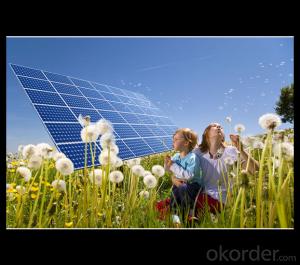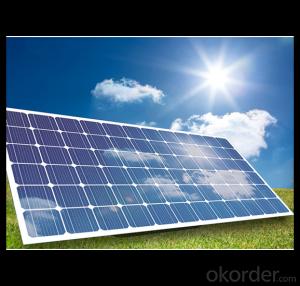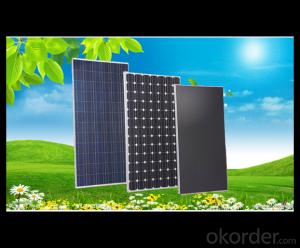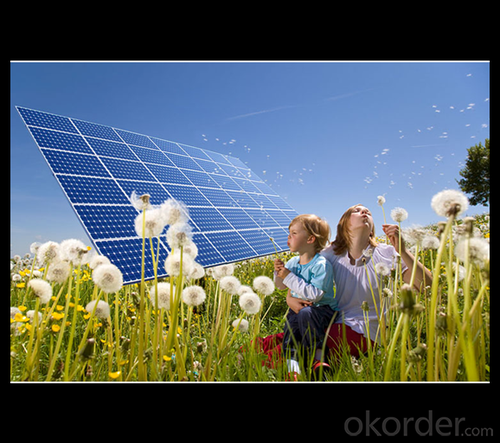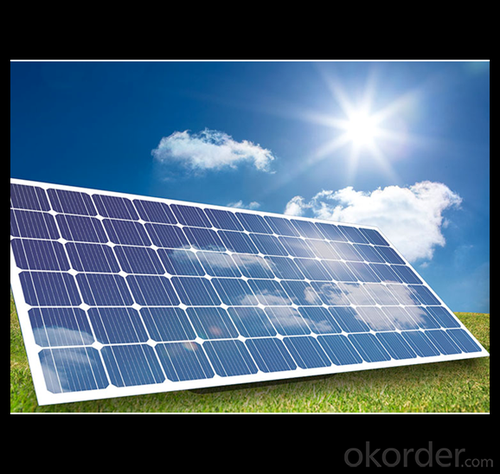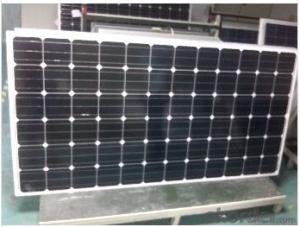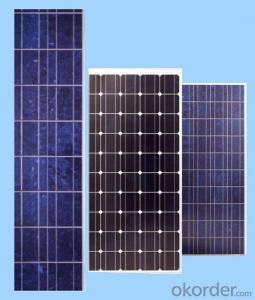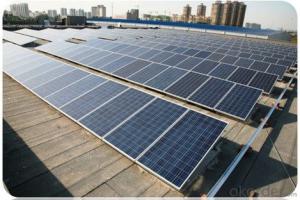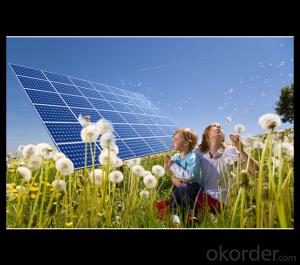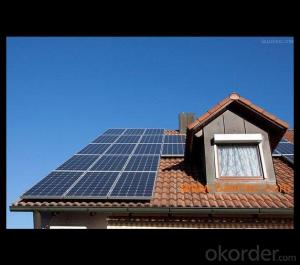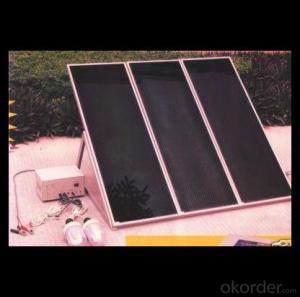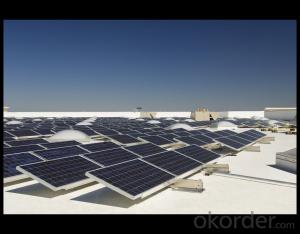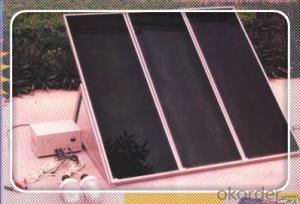Solar Panels for Sale Phoenix - 240w Direct Factory Sale Price 240-260watt Solar Panels
- Loading Port:
- China main port
- Payment Terms:
- TT OR LC
- Min Order Qty:
- 10000 watt
- Supply Capability:
- 100000 watt/month
OKorder Service Pledge
OKorder Financial Service
You Might Also Like
Specification
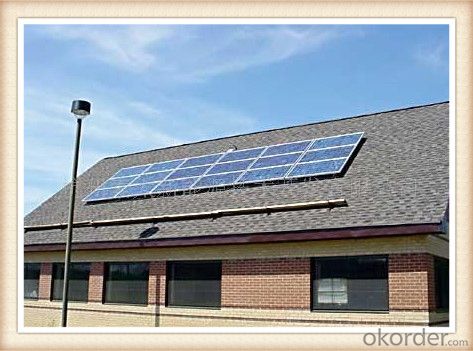
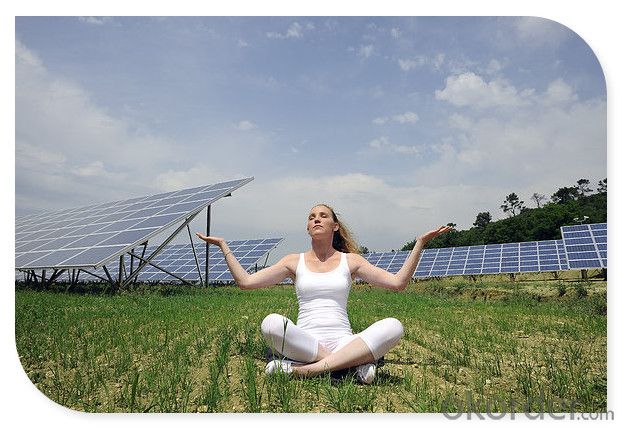
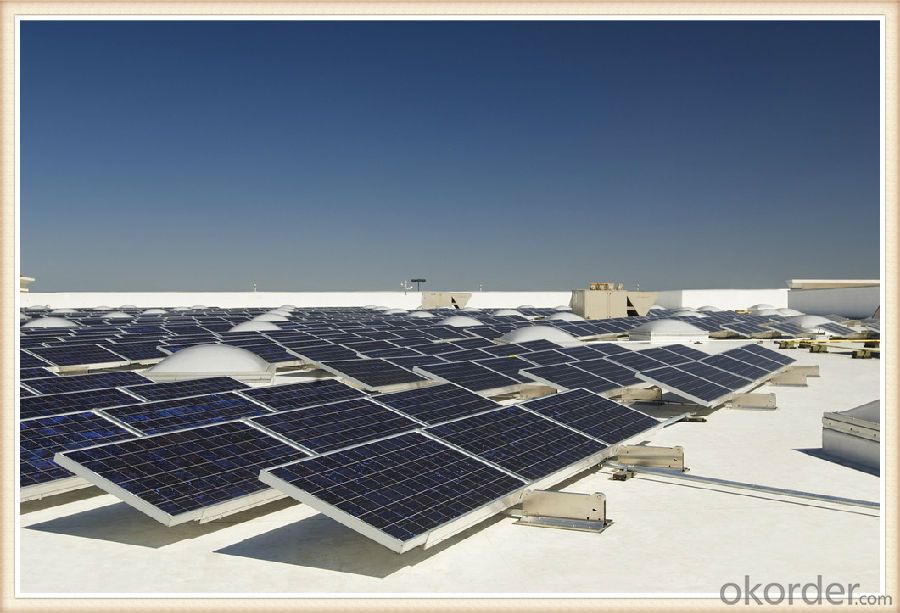
Solar Module Introduction
Solar modules use light energy (photons) from the sun to generate electricity through the photovoltaic effect. The majority of modules use wafer-based crystalline silicon cells or thin-film cells based on cadmium telluride or silicon. The structural (load carrying) member of a module can either be the top layer or the back layer. Cells must also be protected from mechanical damage and moisture. Most solar modules are rigid, but semi-flexible ones are available, based on thin-film cells. These early solar modules were first used in space in 1958.
Electrical connections are made in series to achieve a desired output voltage and/or in parallel to provide a desired current capability. The conducting wires that take the current off the modules may contain silver, copper or other non-magnetic conductive transition metals. The cells must be connected electrically to one another and to the rest of the system. Externally, popular terrestrial usage photovoltaic modules use MC3 (older) or MC4 connectors to facilitate easy weatherproof connections to the rest of the system.
Specification
Model Type | |
Peak Power-Pmax(W) | 5-200W |
Open Circuit Voltage-Voc(V) | 44.2 |
Maximum Power Voltage-Vmp(V) | 36 |
Short Circuit Current-Isc(A) | 5.4 |
Maximum Power Current-Imp(A) | 5 |
Maximum System Voltage | 1000V DC |
Maximum Series Fuse Rating | 10A |
Power Tolerance | -1~+3% |
Temperature Coefficients of Pmax | -0.45%/℃ |
Temperature Coefficients of Voc | -0.348%/℃ |
Temperature Coefficients of Isc | 0.031%/℃ |
Nominal Operating Cell Temperature | 44.5±2℃ |
Standard Testing Condition(STC) | Irradiance:1000W/m²;Temperature:25℃;AM=1.5 |
Qualification Test Parameters | |
Operating Temperature | -40℃~+85℃ |
Storage Temperature | -40℃~+85℃ |
Pressure Bearing | ≥5400Pascal/m² |
Wind Bearing | ≥5400Pascal/m² |
Mechanical Characteristics | |
Cell Size | Mono 125*125mm±0.5 |
No.of Cells | 72pcs(6*12) |
Dimension | 1580*808*40mm |
Weight | 15.5Kg |
Glass | 3.2mm High Transmission,Low Iron |
Frame | Anodized Aluminum Alloy |
Junction Box | IP65Rated |
Internal Diodes | 3 Bypass Diodes |
Cable | 1*4.0mm² Length 900mm |
Images
Packing & Shipping:
We have rich experience on how to pack the panels to make sure the safety on shipment when it arrives at the destination.
The normal size is packed by 25pcs/ carton / pallet. Paper carton for FCL shipping and wood carton for LCL shipping.
Features
1.High reliability with guaranteed -3% to +5% power output tolerance, ensuring return on investment
2.High conversion efficiency based on leading innovative photovoltaic technologies
3.Withstands high wind-pressure and snow load, and extreme temperature variations
4.Attractive appearanceUnique frame design, high mechanical strength, and easy Installation
Warranty:
For c-Si panel: 25years output warranty for no less than 80% of performance, 10 years output warranty for no less than 90% of performance. Free from material and workmanship defects within 5 years.
For a-Si panel: 20 years output warranty for no less than 80% of performance, 10 years output warranty for no less than 90% of performance. Free from material and workmanship defects within 2 years.
•100% product quality protection
•100% on-time shipment protection
•100% payment protection for your covered amount
FAQ:
(1)What price for each watt?
It depends on the quantity, delivery date and payment terms.
(2)What is your size for each module? Can you tell me the Parameter of your module?
We have different series of panels in different output, both c-Si and a-Si. Please take the specification sheet for your reference.
(3)Can you provide the peripheral products of the solar panels, such as the battery, controller, and inverter? If so, can you tell me how do they match each other?
Actually we are only manufacturer of solar panels, but we could try to source them for you in China if you need. We could provide you an optimal system design to instruct you how to install.
(4)Do you have the CE, TUV, UL Certification?
We’ve already passed all the tests, and any certificate is available.
(5)Have you ever sold your products to companies in my country?
Of course, we have customers in all general PV markets, but I think we should expand our market share along with the market growth.
(6)When did your company set up? You are a new company, how can I believe your quality?
We entered into Solar PV industry in 2005, now we have several plants in manufacturing of a-Si and c-Si panels, and our capacity is 220MW per year. Till now we have already passed all the tests by authorized laboratories, e.g. TUV, VDE, UL.
(7)Can you help us install the module if we cooperate with you?
We haven’t entered into installation sector, but we have the plan in near future.
(8) How do you pack your products?
We have rich experience on how to pack the panels to make sure the safety on shipment when it arrives at the destination.
(9) Can you do OEM for us?
Yes, we can.
(10)Can we visit your factory?
Surely, I will arrange the trip basing on your business schedule.
- Q: Solar panel experiment ?wat are some experiments with solar panels that has not yet been proven? ideas
- Acciona of Spain is actively conducting research in all sorts of alternative energy. I understand they have an experimental solar farm someplace in the desert southwest of the U.S. that is made up of 283,000 panels. I don't know the size of the panels or anything else about the project other than that. 50 years ago it would have been the U.S. conducting leading research in solar energy-especially in the U.S. Southwest.
- Q: How do solar panels affect the property's energy management system?
- Solar panels can have a significant impact on a property's energy management system. By harnessing the power of the sun, solar panels generate clean and renewable energy, reducing the property's reliance on traditional energy sources. This allows for greater energy independence and can result in substantial cost savings on electricity bills. Additionally, solar panels can feed surplus energy back into the grid, further optimizing energy management and potentially earning credits or incentives. Overall, solar panels play a crucial role in enhancing the efficiency and sustainability of a property's energy management system.
- Q: Can solar panels be used for heating water?
- Yes, solar panels can be used for heating water. Solar water heating systems utilize the sun's energy to heat water for domestic or commercial use. These systems typically consist of solar collectors, which absorb sunlight and convert it into heat, and a storage tank to store the heated water.
- Q: What i would like to know is if you were using commercially available solar panels, clustered as close together as possible and spread out on one acre, how much electrical energy is produced? if u can 'translate' this into terms of ( hour of average daylight = powering a ____ for X units of time)
- Above the atmosphere, total solar flux is about 365 Watts per square meter. After passing through the atmosphere, the rule of thumb is about 000 Watts per square meter if the Sun is directly overhead. Solar panels are far from 00% efficient, though ... most silicon-based cells run about 20% efficiency. Which leaves you with roughly 200 Watts per square meter. One acre is 4046 square meters, which means that if you had an entire acre of silicon solar panels, they could generate a theoretical 800 kilowatts on a sunny day at noon. With the Sun 30° above the horizon, you could expect a 30% drop in power, declining to zero at sunrise and sunset. And that's assuming zero cloud cover, which is also an unreachable ideal. To give you an idea of scale, an average American home uses or 2 kilowatts. A large coal or nuclear power plant generates about a million kilowatts.
- Q: im aware i dont fully understand. but with what i do. if P = iv, and current changes with voltage, whats the point of changing either. if in any cicumstance, you end up with the same wattage, how does changing either effect a solar setup. (2v panel vs 24v)thanks in advance. explain in laymans if you can.
- The choice of solar panel voltage comes down more to what the panels will be connected to. You're right that power can remain the same at the different voltages. Higher input (panel) voltages are sometimes used in inverter systems to reduce the effect of voltage draw-down. 2v panels (about 20v open circuit) work well for charging 2v batteries, connected in parallel, through a charge controller. For use of a grid-tie inverter, higher input voltages are sometimes used to reduce the effects of draw-down. You want to select and wire (parallel vs. series) your panels based on the input voltage requirement of the load, whatever it may be.
- Q: if I have a battery bank of of 6 L-6 Trojan batteries, 6V 390AH, wired in series parallel to give me 2V at 70AH (or 4,040WH) what kind of solar panels should I purchase assuming I have 8 hours of sunlight, a solar tracking system and I want to make sure I can fully recharge my batteries everyday if i use up all the power every night?i understand there are efficiency issues to consider which i have not calculated in yet. thanks.
- If okorder /... yet, it's worth browsing the off-grid section. 8 peak equivalent sun hours a day on average is very achievable with tracking, but are you sure you really want to spend on tracking? It's a lot of trouble and expense - might be cheaper just to get more panels. Also be aware that when you have a lead-acid battery bank capable of (say) 000 Ah, that is the capacity that the batteries could supply as a one-shot deal. If you ever took that much from them, they would be ruined. Typically, you would try to take only 20% of the capacity before recharging, although some batteries let you take 50%, with reduced life. Have you considered wiring the batteries as 36 volts? There would be more efficiency, and less problems with equalizing the batteries when charging. Unless 2 volts is really the output that you need most. Sorry to redirect you, but I can't recommend that forum too highly. Lots of considerations.
- Q: (For a project)I know they are made of silicon, but I want to EVERYTHING they are made of. Ex Metal (What kind)Please tell me everything used from their production to the finished projectThank you
- Well i am not sure but to my knowledge all i know is that the purpose is to save solar cells which are later created into energy Solar energy is generated from solar panels. Solar panels are slabs of semi-conductor metal. Technically speaking, they are a slab of silicon semi-conductor doped or added with impurities to make it a better conductor. Solar panels could also be made of Gallium Arsenide which is a semi-conductor metal exclusively used in photo-voltaic cells. The silicon slabs are polished and glossed before doping. After processing, for protection, a thin glass layer is embossed on the solar cells slab. Silicon also is shiny and reflects about 35% of sunlight. Hence, an anti-reflective coating is usually applied over the slabs to reduce the amount of sunlight lost. Amorphous silicon solar panels are different from the traditional ones made from silicon slabs. Amorphous silicon solar cells are thinner and more efficient that the silicon ones and also the materials cost of this variety is far lesser than the traditional. Amorphous silicon slabs are developed with superior processes which makes them less susceptible to breakage during transportation. This makes them a more viable investment when it comes to buying solar panels.
- Q: Can solar panels be installed on a small scale?
- Yes, solar panels can definitely be installed on a small scale. In fact, they are highly versatile and can be installed on rooftops, balconies, or even in small yards. The size and capacity of the solar panel system can be tailored according to the available space and energy requirements of the user. This makes solar panels a feasible and practical option for both residential and commercial settings, enabling individuals to generate their own clean and renewable energy.
- Q: lately i have been interested in solar power. i own my own home and in Texas it's HOT, so my A/C is always on and that light bill is like $300.00 a month. i was looking at other light companies but then i remembered that there are the so called solar power but i dont knowknow to start or how it would work to power the a/c machine...pls help
- Then search the internet for the best prices on a GTS grid tie system.
- Q: What happens to solar panels during extreme weather conditions?
- During extreme weather conditions, such as hurricanes or hailstorms, solar panels can be damaged. Strong winds can cause them to be torn off or destroyed, while hail can crack or break the glass surface of the panels. Additionally, heavy snowfall can cover the panels, reducing their ability to generate electricity. However, most solar panels are designed to withstand various weather conditions, and manufacturers often perform rigorous testing to ensure their durability and resistance.
Send your message to us
Solar Panels for Sale Phoenix - 240w Direct Factory Sale Price 240-260watt Solar Panels
- Loading Port:
- China main port
- Payment Terms:
- TT OR LC
- Min Order Qty:
- 10000 watt
- Supply Capability:
- 100000 watt/month
OKorder Service Pledge
OKorder Financial Service
Similar products
Hot products
Hot Searches
Related keywords
